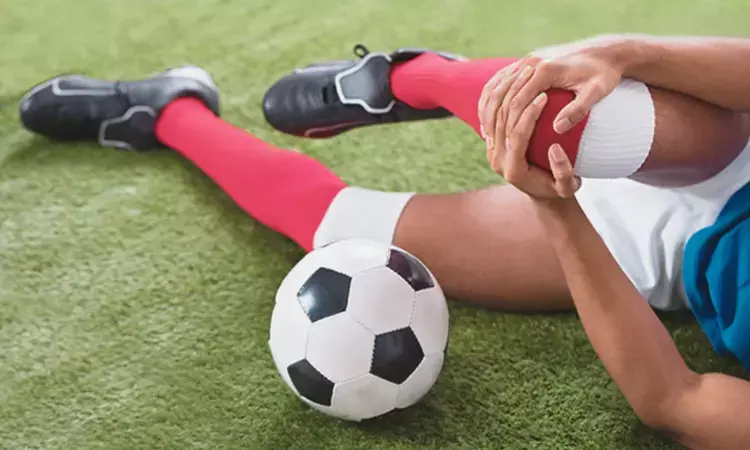- Home
- Medical news & Guidelines
- Anesthesiology
- Cardiology and CTVS
- Critical Care
- Dentistry
- Dermatology
- Diabetes and Endocrinology
- ENT
- Gastroenterology
- Medicine
- Nephrology
- Neurology
- Obstretics-Gynaecology
- Oncology
- Ophthalmology
- Orthopaedics
- Pediatrics-Neonatology
- Psychiatry
- Pulmonology
- Radiology
- Surgery
- Urology
- Laboratory Medicine
- Diet
- Nursing
- Paramedical
- Physiotherapy
- Health news
- Fact Check
- Bone Health Fact Check
- Brain Health Fact Check
- Cancer Related Fact Check
- Child Care Fact Check
- Dental and oral health fact check
- Diabetes and metabolic health fact check
- Diet and Nutrition Fact Check
- Eye and ENT Care Fact Check
- Fitness fact check
- Gut health fact check
- Heart health fact check
- Kidney health fact check
- Medical education fact check
- Men's health fact check
- Respiratory fact check
- Skin and hair care fact check
- Vaccine and Immunization fact check
- Women's health fact check
- AYUSH
- State News
- Andaman and Nicobar Islands
- Andhra Pradesh
- Arunachal Pradesh
- Assam
- Bihar
- Chandigarh
- Chattisgarh
- Dadra and Nagar Haveli
- Daman and Diu
- Delhi
- Goa
- Gujarat
- Haryana
- Himachal Pradesh
- Jammu & Kashmir
- Jharkhand
- Karnataka
- Kerala
- Ladakh
- Lakshadweep
- Madhya Pradesh
- Maharashtra
- Manipur
- Meghalaya
- Mizoram
- Nagaland
- Odisha
- Puducherry
- Punjab
- Rajasthan
- Sikkim
- Tamil Nadu
- Telangana
- Tripura
- Uttar Pradesh
- Uttrakhand
- West Bengal
- Medical Education
- Industry
Indian Study Highlights Personalized Strategies for Preventing ACL Injuries in Athletes

India: Anterior cruciate ligament (ACL) injuries are common and debilitating, particularly in athletes involved in high-impact sports. A recent scoping review published in the Journal of Orthopaedics sheds light on effective strategies to prevent ACL injuries, stressing the importance of a personalized and multifaceted approach to reduce the risk, especially for athletes at higher risk due to sports demands or personal factors.
Dr. Raju Vaishya, author of the study and a specialist from the Orthopaedics Department at Indraprastha Apollo Hospitals, New Delhi, India, emphasized the significance of the review. "The study highlights the importance of a personalized and multifaceted approach to preventing ACL injuries, particularly through risk stratification and advanced training techniques," Dr. Vaishya explained. He further noted that the review provides valuable insights by identifying both modifiable and non-modifiable risk factors.
The study advocates for integrating strength training, neuromuscular training, and advanced technology into injury prevention programs. "This comprehensive approach can guide the development of targeted strategies to reduce ACL injury incidence, particularly in high-risk populations," Dr. Vaishya added.
The motivation behind the review stemmed from the high prevalence of ACL injuries among athletes and their severe long-term consequences. Dr. Vaishya shared, "There is a pressing need for effective prevention strategies, especially considering the emotional, physical, and financial impacts on young athletes." The review aimed to evaluate the risk factors for ACL injuries and assess current preventive strategies that can improve athlete safety.
For this purpose, the researchers conducted a thorough literature search on November 20, 2024, across multiple databases, including Embase, PubMed, Web of Science, and Cochrane Library. They included articles published between 2000 and 2024 focusing on ACL injury prevention and excluded editorial content, non-clinical studies, and non-English publications.
The search initially yielded 322 articles, which was reduced to 94 after deduplication. Following title screening, 46 studies were reviewed, leading to the inclusion of 14 relevant manuscripts.
Key Findings:
- ACL injuries are caused by various factors, with female athletes being 2.2 times more susceptible.
- Genetic factors, particularly collagen-related SNPs, and biomechanical patterns, such as landing techniques and knee positioning, significantly contribute to ACL injuries.
- Effective preventive programs include strength training, neuromuscular training, and advanced technology like wearable devices and video analysis.
- Given the higher susceptibility of female athletes, Dr. Vaishya recommends preventive strategies like neuromuscular training, plyometric and strength exercises, flexibility and balance routines, and education on injury risks and proper techniques.
Dr. Vaishya emphasized that neuromuscular and strength training are the most practical and effective strategies. "These can be incorporated into regular training without specialized equipment," he noted. Additionally, emphasizing proper biomechanics and agility drills can significantly reduce ACL injury risks during sport-specific activities.
The study does have limitations, including potential biases in the selected articles, a focus on specific populations, and the exclusion of non-English publications. Dr. Vaishya pointed out that further research is needed to explore preventive programs, wearable technology, and biomechanical monitoring for ACL injury prevention.
In conclusion, Dr. Vaishya stresses the importance of proactive engagement in ACL injury prevention by all stakeholders, including coaches, trainers, athletes, and healthcare professionals. By understanding individual risk factors and implementing personalized training, ACL injury rates can be reduced. He advocates for the adoption of evidence-based strategies, such as neuromuscular control and biomechanics training, while fostering an open environment for athletes to discuss injury concerns. Ongoing education and collaboration among researchers, practitioners, and athletes are key to reducing ACL injuries, improving athlete safety, and enhancing performance outcomes.
Reference:
Viswanathan, V. K., Vaishya, R., Iyengar, K. P., Jain, V. K., & Vaish, A. (2025). Strategies for Preventing Anterior Cruciate Ligament Injuries in Athletes: Insights from a Scoping Review. Journal of Orthopaedics. https://doi.org/10.1016/j.jor.2025.01.001
Dr Kamal Kant Kohli-MBBS, DTCD- a chest specialist with more than 30 years of practice and a flair for writing clinical articles, Dr Kamal Kant Kohli joined Medical Dialogues as a Chief Editor of Medical News. Besides writing articles, as an editor, he proofreads and verifies all the medical content published on Medical Dialogues including those coming from journals, studies,medical conferences,guidelines etc. Email: drkohli@medicaldialogues.in. Contact no. 011-43720751


